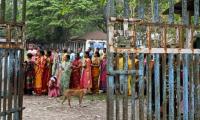Wellington: New Zealand on Friday extended a national lockdown sparked by a Delta virus outbreak into next week but warned restrictions would last longer in the infection epicentre of Auckland.
The Delta cluster emerged in Auckland last week, ending a six-month run without local transmission that had made New Zealand one of the world’s last Covid-free zones. While there were 70 new cases reported on Friday, taking the total to 347, Prime Minister Jacinda Ardern said there were signs the outbreak would soon peak if stay-at-home orders remained in place.
"We may be seeing the beginning of a plateau in cases," she said. "Our job is to keep up the hard work in order to bend, and then flatten, the (infection) curve." Ardern said a nationwide lockdown imposed on August 17 would now continue until August 31.
She said Auckland, where all but 14 cases have been found, and the neighbouring region of Northland, were set to face at least an extra two weeks of hard lockdown. New Zealand is pursuing a "Covid zero" elimination strategy -- which has resulted in just 26 deaths in a population of five million -- using strict border controls backed by hard lockdowns when any cases do slip through.
Ardern said that from Wednesday areas outside Auckland and Northland would move down a notch to level three on New Zealand’s four-tier virus alert system. Most residents must still remain at home during level three but some businesses such as restaurants and retail outlets can reopen using contactless collection methods.
Ardern said police checkpoints would be set up to ensure there was no travel between Auckland, Northland and the rest of the country.Fatigue and shortness of breath still afflict many patients a year after their hospitalisation for Covid-19, according to a new Chinese study calling for a better understanding of the pandemic’s long-term health effects.
Around half of patients discharged from hospital for Covid still suffer from at least one persistent symptom -- most often fatigue or muscle weakness -- after 12 months, said the study published in British medical journal The Lancet on Friday.
The research, the largest yet on the condition known as "long Covid", added that one in three patients still have shortness of breath a year after their diagnosis. That number is even higher in patients hit more severely by the illness.
"With no proven treatments or even rehabilitation guidance, long Covid affects people’s ability to resume normal life and their capacity to work," The Lancet said in an editorial published with the study.
"The study shows that for many patients, full recovery from Covid-19 will take more than 1 year." The study followed nearly 1,300 people hospitalised for Covid between January and May 2020 in the central Chinese city of Wuhan -- the first place affected by a pandemic that has since infected 214 million people worldwide, killing more than 4 million.
The share of observed patients with at least one symptom decreased from 68 percent after six months to 49 percent after 12 months. Respiratory discomfort increased from 26 percent of patients after six months to 30 percent after 12 months, it said.
In a related development, an unvaccinated teacher at an elementary school in California spread the Delta variant of the coronavirus to at least 26 other people, including 12 students in their classroom, a new study by the Centers for Disease Control and Prevention (CDC) said Friday.
The health agency said the case highlights the importance of vaccinating school staff in order to protect young children who are not yet eligible for vaccines, as schools reopen amid a new nationwide surge driven by the ultra-contagious Delta variant.The CDC said the incident took place in Marin County, a suburb of San Francisco.
The teacher, who reported attending social functions from May 13-16, became symptomatic on May 19 but did not take a Covid test until May 21, initially believing the symptoms were due to allergies.
Former US president Donald Trump. — AFP NEW YORK: The judge overseeing former US president Donald Trump’s...
Bosnian Serb leader Milorad Dodik. — AFP FileSARAJEVO: The parliament of Bosnia´s autonomous Serb Republic adopted...
Australia's Prime Minister Anthony Albanese speaks during the opening ceremony of the 6th China International Import...
Indonesia's Ruang volcano. — AFP JAKARTA: Indonesia shut a provincial airport and evacuated hundreds of people...
Myanmar’s detained former leader and Aung San Suu Kyi. — AFP LONDON: Myanmar’s detained former leader and Aung...
President Ruto is seen with the chief of the Kenya Defence Forces General Francis Ogolla in this photo on 28 February....







